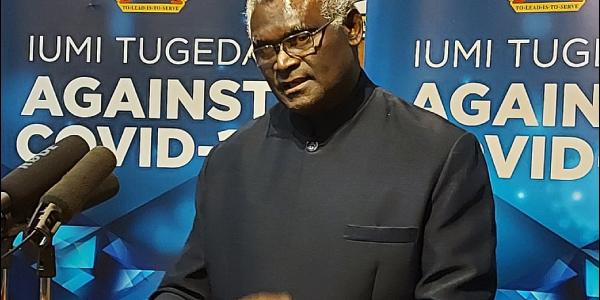Prime Minister Manasseh Sogavare last week has announced six short to Medium term measures the National Government is proposing to mitigate the impact of COVID-19 on Government finances.
Following an assessment of expenditure and revenue projections, the first measure that the Government proposes is to ensure that essential government machineries are operational even during an event of any future lockdown.
Second on the list of proposals is to rationalize government resources to focus on the productive and resources sectors and to create funding space for new initiatives the government may want to implement in 2022.
Third on the list is to review public service COVID-19 allowances, while the fourth proposal is to introduce new revenue measures, which will impose export duty on minerals while at the same time strengthen compliance and introduce new operations within Customs & Excise and the Inland Revenue Division.
The fifth proposal is to mobilize domestic and external financing and the sixth is to review the Treasury bill with the intention to increase the issuance limit. The Annual Borrowing limit will also be reviewed to align with the planned commitments in the 2022 Development budget.
Sogavare said the main priority for the Government is to continue to build economic resilience and focus on polices that will promote economic recovery and growth.
To support this, it is critical that the country’s international border is reopened with minimal restrictions on internal movement of vessels, aircraft and cargoes.
The Government is intending to reopen the country’s borders by 1 July 2022 depending on achieving an effective and efficient vaccination roll-out.
“An environment conducive to economic activity must be created, which, means that trade and investment must be promoted. However, it must be finely balanced with health-related measures” Sogavare said.
Recent experiences indicated that even the most minor lockdown is likely to have a negative impact on the economy, including loss of employment as businesses scale down operations, and increasing inflationary pressures in line with shortages of goods and services.
This means that government finances are likely to be affected, and financial institutions could also come under stress with a build-up in loan arrears.
As such, there must be a reasonable and feasible trade-off between health and economic considerations to manage the current situation.
Global experiences also showed that once a country has experienced a community transmission of COVID-19, the virus will remain active for the foreseeable future.
Such situations emphasized the importance of a swift vaccination roll-out to ensure the safety of all Solomon Islanders to provide the best footing for an economic recovery, and to ensure that future growth prospects can reach their full potential.
– GCU









